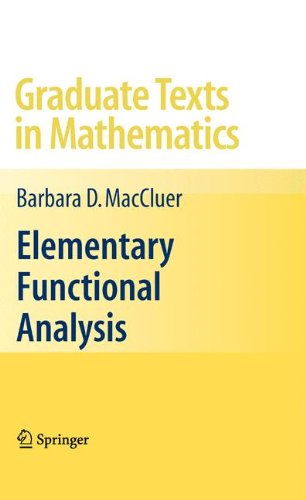

Most ebook files are in PDF format, so you can easily read them using various software such as Foxit Reader or directly on the Google Chrome browser.
Some ebook files are released by publishers in other formats such as .awz, .mobi, .epub, .fb2, etc. You may need to install specific software to read these formats on mobile/PC, such as Calibre.
Please read the tutorial at this link: https://ebookbell.com/faq
We offer FREE conversion to the popular formats you request; however, this may take some time. Therefore, right after payment, please email us, and we will try to provide the service as quickly as possible.
For some exceptional file formats or broken links (if any), please refrain from opening any disputes. Instead, email us first, and we will try to assist within a maximum of 6 hours.
EbookBell Team

5.0
48 reviewsThis text is intended for a one-semester introductory course in functional analysis for graduate students and well-prepared advanced undergraduates in mathematics and related fields. It is also suitable for self-study, and could be used for an independent reading course for undergraduates preparing to start graduate school.
While this book is relatively short, the author has not sacrificed detail. Arguments are presented in full, and many examples are discussed, making the book ideal for the reader who may be learning the material on his or her own, without the benefit of a formal course or instructor. Each chapter concludes with an extensive collection of exercises.
The choice of topics presented represents not only the author's preferences, but also her desire to start with the basics and still travel a lively path through some significant parts of modern functional analysis. The text includes some historical commentary, reflecting the author's belief that some understanding of the historical context of the development of any field in mathematics both deepens and enlivens one's appreciation of the subject.
The prerequisites for this book include undergraduate courses in real analysis and linear algebra, and some acquaintance with the basic notions of point set topology. An Appendix provides an expository discussion of the more advanced real analysis prerequisites, which play a role primarily in later sections of the book.
Barbara MacCluer is Professor of Mathematics at University of Virginia. She also co-authored a book with Carl Cowen, Composition Operators on Spaces of Analytic Functions (CRC 1995).